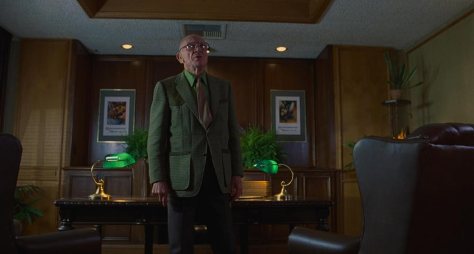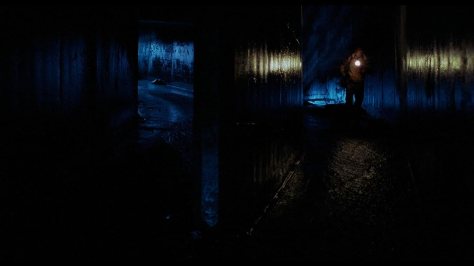
One of the major inflection points in the evolution of the monster movie was when well-informed fans started working behind the scenes, aware of all the tropes and knowing just where to push them to take something from cliche to slyly self-aware examination. The ur-example of this was the Joe Dante-directed Piranha, which took what could have easily been a movie simply following the trend of ripping off Jaws and turned it into something else entirely—someone was clearly paying attention, because when director Lewis Teague (later of movies like Cujo) was given the job of making a Jaws rip-off about a giant alligator, he threw out the original script and called in Piranha screenwriter John Sayles (later of several award-winning films) to help him craft something more interesting. Together, they produced a movie in the middle ground between traditional drive-in schlock, the intelligently eccentric B-movies typified by Larry Cohen’s entries in the genre, and the cartoonish and loving parodies that Dante continued to refine in the eighties—and it does it in a way casual and subtle enough that many critics of the time didn’t even catch the dark comedy at the heart of Alligator.


Take the opening scenes: having a young girl watch an alligator wrestling exhibition go horribly, bloodily awry, and then immediately wanting a baby alligator of her own is a pretty succinct representation of the caustic worldview espoused by the movie, one that even laps the cynicism evident in Sayles’ script for Piranha. Many of the surface details of Alligator seem obvious or trite, right from the initial story pitch of making a horror movie out of the urban legends of alligators living in the sewers of major cities. Some of the details here have remained common and eventually overused: in the past month, I’ve written about two other movies with almost identical climactic scenes of explosions erupting out of manholes, although timeline-wise, this movie did that first. But the fact that these moments and characters could be cliche in other contexts only highlights the way this movie makes hay out of them, twisting them in a way where their inherent ridiculousness is fully exploited.

After the moment where the father of the girl from the opening angrily flushes the adorable gator baby, which the girl named Ramon—with a TV blaring a news story about the protests at the 1968 Democratic National Convention in Chicago, a hilariously over-the-top way to set the scene’s historical context (much as the Vietnam War served as a signpost for Piranha)—we are thrust into the go-go eighties, a world that is oftentimes even tackier than the mock-sixties we began in. Some details in the setting would place it in Chicago, others in a random city in Missouri, but in the end it doesn’t really matter: this is Urban Archetype City, with massive sewers and storm drains (which as seasoned creature feature viewers know only exists in one city, and this barely attempts to hide it), wide garbage-strewn alleys, and swimming pool-marked suburban dwellings in equally exaggerated proportions. It’s the kind of city where we could potentially see a giant alligator hiding beneath piles of trash, or bursting out of the concrete of a city street; in fact, it almost seems to exist solely so we can see those things happen.

Our lead is detective David Madison (Robert Forster), established early as the world’s unluckiest police officer, almost solely defined in the minds of everyone else by the death of his partner in a botched job in St. Louis. This itself is a cliche, and while it does seem to take this backstory seriously at times, the movie goes out of its way to make Madison seem comically pathetic, from his bachelor living situation to the recurring joke where every other character comments on his receding hairline (a joke suggested by Forster himself.) We also establish that Madison is competent at his job when he defuses a situation with a mentally ill man threatening to blow up the police station, but he and everyone else view even the most gruesome parts of their jobs with a sarcastic nonchalance—for example, when they’re examining severed limbs and dead dogs being fished out of the sewer system.

Of course, the obvious thing has occurred: Ramon has survived in the sewers for twelve years and has gotten significantly larger—he’s portrayed by either a full-sized puppet or shots of a real caiman strolling through miniature sets, both perfectly effective (or at least endearing) for a movie of this budget and vintage (evidently, actor Bryan Cranston had an early Hollywood gig assisting the effects department of this movie.) This has happened because a big pharmaceutical company has been injecting experimental hormones into dogs, and then dumping their dead bodies into the sewer, giving the underground gator a food source that has hypercharged both his growth and has also given him a metabolic rate that makes his appetite insatiable, a perfect combo for a movie monster. The pharmaceutical angle is another bit of cynicism, creating entertainingly detestable, casually evil corporate villains—mainly the company’s owner Slade (Dean Jagger, our heroic scientist from X the Unknown) and his future-son-in-law, who literally tortures and kills puppies—who are assisted by yet another entertaining version of a cliche character, the corrupt mayor (Jack Carter.) After witnessing the gator kill another partner (Perry Lang) while investigating the sewers, we do spend time dealing with people not believing Madison about the existence of a giant alligator, including the local herpetologist Marisa Kendall (Robin Riker) who—surprise!—was the girl from the opening, having taken the loss of her beloved Ramon (her dad told her that he died while she was at school) in stride and becoming a snake-loving scienctist (you might expect that she would figure out that the gator is Ramon, but that might have been too silly even for this movie—even so, that still creates a sort of tragic angle to her presence in the story.) Events soon conspire to make the existence of the gator known to the entire city, so we can more efficiently get to the meat of the movie.

The norm for a monster movie is to have the authorities frustratingly unable to deal with the monster threat until the final reel—whatever allows for a maximum amount of monster carnage—sometimes leading to ludicrous contrivances that make these people look like incompetent fools. Alligator does one better, by crafting an entire movie about a city full of ignoramuses and corrupt scumbags who are simply incapable of finding and dealing with a thirty-foot alligator living in, and beneath, their backyards. We see police officers and heavily-armed national guardsmen patrolling the streets with rocket launchers, all completely useless, and we even get an over-the-top boat stunt & explosion (again, similar to Piranha) when several of them, armed with a box of grenades, are bamboozled by Ramon in the middle of a lake. A swathe of modern humanity are up for skewering here—for example, the press are a pack of ghouls who seek only to sensationalize, even prodding Madison at press conferences about his tragic backstory, and it’s the ill-considered venture by one doggedly smug reporter (Bart Braverman) into the sewers that produces the irrefutable evidence of the gator, at the cost of him being (deservedly?) chomped. We also see the gator become a local media sensation, with hawkers selling alligator-themed goods, including another baby alligator, which becomes important only in the final stinger scene. Of course, the amoral rich and their political allies are at the centre of it, leading to a climactic alligator wedding crashing sequence where both the mayor and Slade get their monster-based comeuppance one after the other (very efficient storytelling!) Just about the only other well-meaning individual other than Madison and Kendall is the police chief (Michael V. Gazzo), who is stuck enforcing the corrupt rule, his voice getting simultaneously higher and more gravelly as the situation goes increasingly haywire. Of course, the ones who actually have some idea of what to do are actively prevented from doing it because they come too close to exposing the part the city’s high society types played in creating this problem.


The joke isn’t simply about the people in charge, or those who are quick to exploit, who make a giant alligator situation that much worse, though—this movie goes far broader, filling its vision of the world with people who are barely tolerable, or otherwise completely ridiculous. One of the brilliant decisions by the city authorities is to hire a big game hunter, Colonel Brock (Henry Silva), to come in and track down the gator—he is probably the most entertainingly wacky character here (in a movie that surprisingly eschews exceedingly cartoonish performances), and despite all his “clever” attempts to treat the city streets like the jungle (such as paying some wary inter-city “natives” to help him), he is as useless as everyone else. Even the younger officer who is one of Ramon’s early victims is portrayed as completely obnoxious, and while we can understand why his death haunts Madison, I don’t imagine most people in the audience feel that bad about his demise. Really, aside from one young kid who is inadvertently pushed into a pool that somehow hides the massive animal, most of the people we see offed kinda deserved it in one way or another—that’s a pretty common thing, especially in the increasingly brutal world of eighties horror that this movie is sort of prelude to, but here it’s especially pointed and intentional. To put it simply, it’s easy to justify a bloody monster massacre when it takes place in a jerky world full of jerks.

The next step after Jaws, as seen here, is implicating not just a few careless people in leadership roles in exacerbating this freak animal issue and leading to more pointless deaths, but a whole system of self-serving and incompetent decision-making that constantly trips over itself, turning a disaster into a sideshow. It’s also suggests that the buffoonish people on top are only reflecting the general buffoonish society they inhabit, of weirdos and people who barely seem capable of paying attention to what’s going on around them—in one particularly great moment, a child who has just seen Ramon emerge from beneath the streets and bite the leg off a police officer runs up to his apartment, runs around his mother who is on the phone the whole time, pulls a large kitchen knife out of a drawer and runs back downstairs, his mother yelling at him not because he’s running off brandishing a knife, but because it’s her good knife. People, generally, are the problem, just as much as the alligator.

Alligator doesn’t alleviate this dark underpinning with overt parody in the way Sayles and Dante approached it in Piranha—although this also rarely approaches that movie’s moments of genuine horror, either, some good use of the darkness of the sewers aside—leading to a relatively subdued sort of comedy (except in the cases of someone like Colonel Brock, or Kendall’s overly-doting mother.) That does give it the feel of an even more confident, subversive take, playing the monster movie tropes straight enough, while still being entirely pointed in its storytelling choices. Rather than use them as simple justification for bloodletting, it wants to really highlight the immorality and bumbling that would allow for this kind of chaos to explode in both horror movies and in real life.
